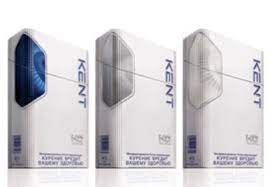The first changes affected Kent cigarettes. Marketers have done a great job and presented to customers a new updated brand of Kent cigarettes. They changed the shape of the pack. The new packaging has acquired rounded corners, has become more stylish and modern. The packaging began to differ in colors depending on the strength of the product. The manufacturer has also updated the range. Kent cigarettes began to be produced in 3 types, which depended on the content of resins in the composition of cigarettes.
Advertisement. The end of the 1990s was marked by an advertising campaign for the brand. At the first stage, marketers presented brand renewal as its desire to keep up with the times, satisfying the desires of its consumers. The second stage focused on the image of cigarettes. Advertising suggested that Kent cigarettes are an indicator of quality and taste. The advertisers’ strategy used helped the company regain its position in the market. The scale of tobacco sales has increased. After a long journey of modernization and recognition, the Kent cigarettes are popular for many consumers and are considered a premium quality product.
The well-known manufacturer monitors the preferences of its customers, constantly updating its cigarette range, improving their taste and design. Even a buyer spoiled by an abundance of species will find in the line of tobacco products exactly those only cigarettes that he prefers to other brands.

What are Kent cigarettes?
The history of the tobacco brand began in the spring of 1952. At this time, new KENT cigarettes from the American company Lorillard Tobacco Company were released. The brand is named after CEO Herbert Kent. These were the first filtered cigarettes. Before that, only cigarettes were produced. Therefore, new tobacco products – long cigarettes with an asbestos filter – became in demand on the American market, for which they could exchange any product or receive a service. The growing tobacco giant was gradually taking over the American market. This continued until the end of the 70s of the 20th century until the British American Tobacco Corporation bought the Kent brand.